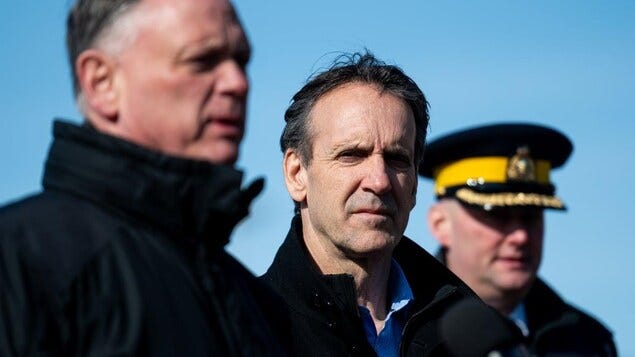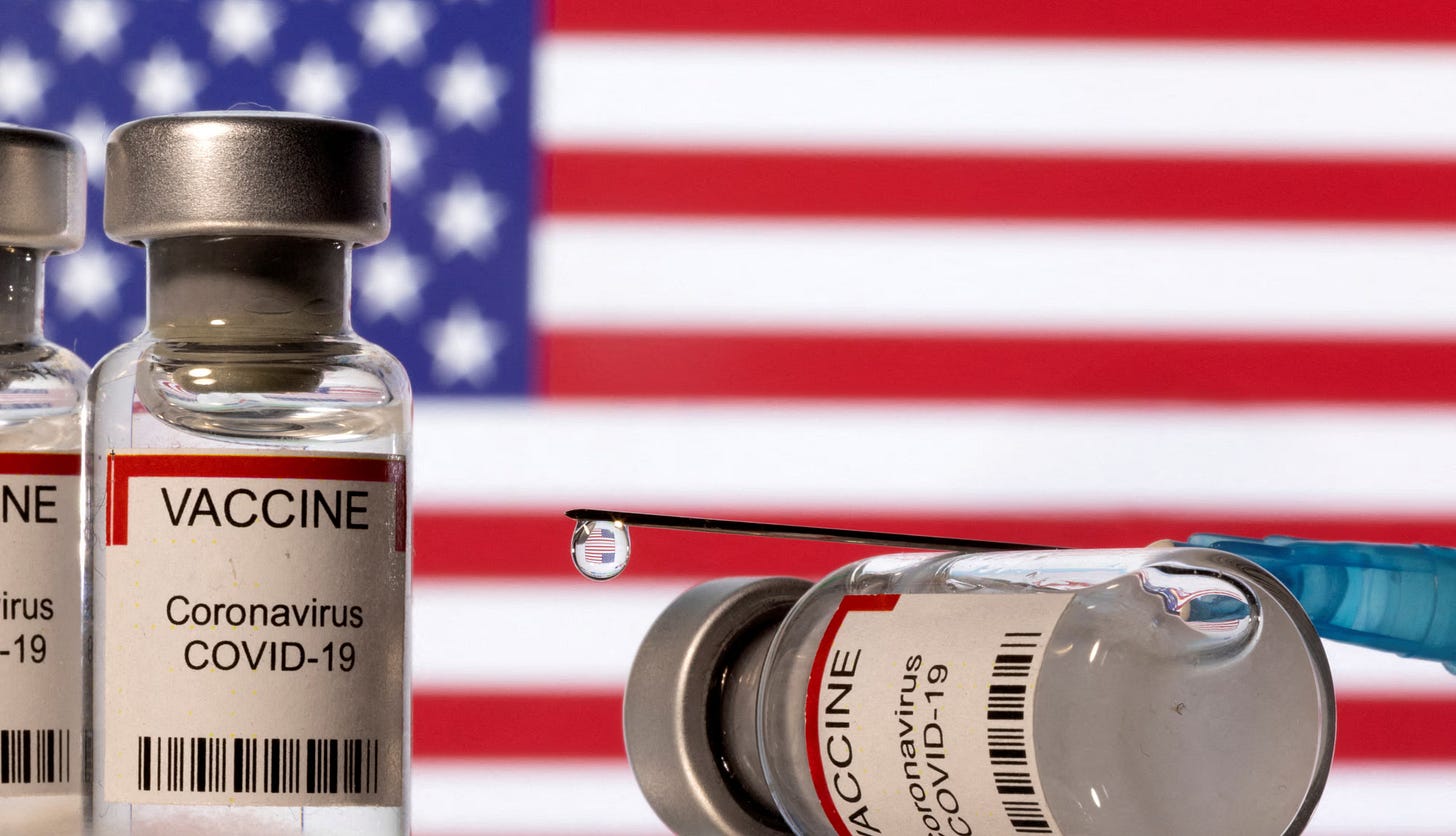Good morning, it’s Tuesday, August 26th. In today’s news, Another $130 million gone as Canada’s endless corruption saga continues, Ottawa pride eaten alive by its own activist factions, Canada’s performative fentanyl crackdown exposed, CDC advisory committee launches a complete review of COVID-19 vaccines, and much more.
First time reading the daily blend? Sign up here.
$130 Million Gone: Another Chapter in Canada’s Endless Corruption Saga
The latest revelation from Ottawa should enrage every Canadian. A federal audit has confirmed that the $130 million Women Entrepreneurship Fund—touted by then-Minister Mary Ng as a lifeline to help “500 women start new businesses”—did nothing of the sort. Instead, all 322 recipients were already in business. Not a single start-up was created. Net job creation? Zero.
The program’s stated purpose was to fuel new businesses and economic growth. What actually happened was the wholesale distribution of public money to existing companies with little accountability, wrapped in a manufactured PR campaign of “success stories.” The audit bluntly concluded: “The fund did not go to new businesses for start-up.” This isn’t a clerical error or a minor mismanagement issue. It’s a fabrication sold to the public while taxpayer dollars vanished into the ether.
But Canadians have heard this story before. This is not an isolated scandal—it’s a pattern.
Take the $323 million vaccine factory boondoggle in Quebec. Medicago was handed hundreds of millions to deliver vaccines. It produced none. The plant is now shuttered, the money gone, and not a single vial ever reached Canadians.
Then there’s the “Green Slush Fund.” The Auditor General uncovered 186 conflicts of interest at Sustainable Development Technology Canada, tied to over $330 million in disbursements. Tens of millions went to ineligible projects, some even linked to board members themselves. The rot ran so deep the fund was dissolved entirely.
And, of course, the infamous ArriveCAN app—a simple traveler data portal that ballooned to nearly $60 million, with contracts funneled to firms like GC Strategies, a two-person consulting shop that pocketed over $19 million while subcontracting the actual work. The Auditor General found procurement rules broken, oversight nonexistent, and invoices lacking even basic details.
Each time, Canadians are told the same thing: these are “lessons learned.” But nothing changes. From pandemic panic spending to green tech handouts to women’s entrepreneurship, the script is identical—big numbers, big promises, no results, and no accountability.
The $130 million Women Entrepreneurship Fund scandal isn’t just about one failed program. It’s another data point proving Canada is being governed by a class that treats the public purse as a private ATM. At what point do Canadians stop tolerating this blatant theft and demand accountability? Source.
Ottawa Pride Eaten Alive by Its Own Activist Factions: How the Left Is Turning On Itself
Ottawa’s Pride parade didn’t end with music, flags, and celebration—it ended with a blockade. A group called Queers for Palestine planted themselves on the parade route near Parliament Hill and refused to move. They shouted slogans, waved signs, and presented a list of demands that had nothing to do with Pride itself—everything from boycotting Israel to staging political town halls.
For over an hour, parade organizers tried to negotiate, reminding the group that 7,000 marchers and 175 community groups were left stranded behind them. But the activists dug in, insisting they were speaking for the “true spirit” of Pride. Permits for street closures were about to expire, so the organizers threw in the towel and cancelled the entire parade. Just like that, months of planning, thousands of participants, and the supposed “safe space” of the event were hijacked and shut down by a louder, more aggressive faction.
This wasn’t bravery. It wasn’t liberation. It was one activist clique steamrolling another in a competition over who’s the most righteous. The irony couldn’t be sharper: Pride, which loves to brand itself as a symbol of unity, was eaten alive by its own invited guests. It’s the ouroboros of left-wing activism—a snake devouring its own tail.
To be clear: this isn’t an attack on the LGBTQ community or the people who participate in it, but ultimately this is good news. When the activist left is too busy tripping over its own purity tests, it loses the ability to keep lecturing and controlling everyone else. Ottawa’s parade cancellation wasn’t some cultural tragedy. It was a glimpse of a movement imploding under the weight of its own contradictions, and frankly, the rest of us should welcome more of it.
Canada’s “Fentanyl Czar” With No Power: Ottawa’s Performative Crackdown Exposed
Ottawa’s much-touted appointment of a “fentanyl czar” was supposed to signal a new era of seriousness in Canada’s fight against cartel-driven drug trafficking. Instead, it has revealed the opposite: an empty gesture designed for optics, not outcomes.
Kevin Brosseau, the man handed the new role in February, admitted in meetings with U.S. officials that he has no real authority to direct the RCMP, CBSA, or any police service. “I don’t tell the RCMP what to do,” one American source recalled him saying. For Washington’s enforcement community, this was confirmation of what they’ve suspected for years: Canada’s leaders talk tough on fentanyl but fail to act when it matters.
The creation of the czar role came after President Donald Trump threatened fentanyl interdiction tariffs earlier this year. In response, Prime Minister Justin Trudeau rolled out a sweeping announcement: new helicopters, 24/7 border monitoring, joint strike forces, and even listing cartels as terrorist organizations. Mark Carney, now Prime Minister, followed with assurances that Canada was making “historic investments” in border security. But insiders say these pledges have amounted to little more than window dressing.
Seizures that Ottawa has trumpeted — like a handful of grams of fentanyl pills at Windsor-Detroit — were driven almost entirely by U.S. intelligence, with no reciprocal sharing from Canadian agencies. The credibility gap was underscored by the disastrous Falkland, B.C. superlab case, where Canadian federal police refused to cooperate with the DEA until after U.S. Treasury sanctions forced their hand. Even then, the RCMP kept the Americans in the dark.
For former DEA officials, this isn’t an isolated misstep. It’s a systemic issue rooted in weak Canadian laws, porous borders, and a culture of non-cooperation. Derek Maltz, the DEA’s acting administrator, bluntly called Canada’s approach “archaic” and “soft-on-crime.” He noted that while Washington has mobilized a whole-of-government response, Ottawa remains stuck in a cycle of grand pronouncements followed by inertia.
In other words, Canada’s fentanyl czar has no power, and Canada’s promises have no teeth. The result is a widening divide with the United States at the very moment when cartel-driven fentanyl trafficking demands unprecedented cooperation. Ottawa can continue the press releases and photo-ops — but as American frustration grows, the consequences will likely be measured not just in lives lost, but in tariffs and trade penalties. Source.
CDC Advisory Committee Launches Review of COVID-19 Vaccines Amid Growing Safety Concerns
For the first time, a CDC advisory group is openly re-examining key safety concerns about the COVID-19 vaccines—including how long mRNA, spike proteins, and lipid nanoparticles persist in the body, the risks of repeated boosters, and potential DNA contamination. The panel, now chaired by MIT professor Retsef Levi—who has previously called for halting Pfizer and Moderna shots—plans to review evidence on adverse events, all-cause mortality, and broader impacts before issuing new recommendations.
With Robert F. Kennedy Jr. having already removed the old advisory committee and scaled back vaccine guidance for children and pregnant women, this review could mark a turning point in US vaccine policy, possibly shifting from universal recommendations toward more cautious, limited use. More
Poll: Conservatives Gain Ground for First Time Since Election as Cost-of-Living Worries Rise
Pierre Poilievre’s Conservatives have pulled ahead of Mark Carney’s Liberals for the first time since Carney became prime minister, according to a new Abacus Data poll. The Tories sit at 41% to the Liberals’ 39%, with affordability and the economy driving voter frustration. Nearly 70% of Canadians say it’s time for change in Ottawa, while the Liberals’ approval has slipped below 50% for the first time under Carney. Despite Carney’s higher personal favourability, Poilievre’s support remains steady and his party’s coalition strong, suggesting momentum could continue shifting as affordability, housing, and economic pressures dominate public concern. More
UK Police Deploy Live Facial Recognition at Notting Hill Carnival as National Rollout Gathers Pace - The technology's rapid expansion raises serious privacy and bias concerns, with the Equality and Human Rights Commission declaring it unlawful. More
Finance Minister: Canada’s Federal Budget to Be Tabled in October - The government has been “working all summer” to present an “ambitious plan” to Canadians, said Champagne. More
Trump Weighs Troop Deployments to Chicago and Baltimore as National Guard Begins Armed Patrols in DC - More
AP and Reuters Employees Among 5 Journalists Killed by Israeli Strike, Outlets Say - More
Mexican Drug Lord Ismael ‘El Mayo’ Zambada, Who Led Sinaloa Cartel with ‘El Chapo,’ Pleads Guilty to Trafficking in US - Zambada entered his plea in a Brooklyn federal court, two weeks after prosecutors said they wouldn’t seek the death penalty against him. Instead, he’s expecting to be sentenced Jan. 13 to life in prison. More
Russia and Ukraine Stage New Prisoner Exchange - This exchange included 146 prisoners of war from each side after mediation by the United Arab Emirates. More
AI Startup Perplexity Launches Revenue-Share Program for Publishers Amid Legal Pressure
Jeff Bezos-backed AI startup Perplexity is offering traditional media firms a share of revenue generated from their content through its Comet Plus browser and AI assistant, setting aside $42.5 million for participating publishers. The move comes amid lawsuits and cease-and-desist letters from News Corp., Forbes, and Condé Nast over alleged unauthorized use of content.
Publishers would earn when articles drive traffic through Comet or are used by its AI assistant, with 80% of Comet Plus revenue going to publishers. The program mirrors multimillion-dollar deals that OpenAI and Google have struck with publishers, but Perplexity is the first to adopt a formal revenue-share model aimed at compensating content creators while avoiding further legal disputes. More
Air Canada Labour Deal Faces Fierce Opposition Over Wages, Suggesting the Vote Could Fail and the Strike Could Resume - More
Keurig Dr Pepper to Buy JDE Peet’s for $18 Billion in Effort to Build Global Coffee Giant - More
Scientists Discover Previously Unknown 6,000-Year-Old Human Lineage in Colombia
Researchers in Colombia have identified a previously unknown human lineage, named the Checua, after sequencing ancient remains excavated near Bogotá. The 6,000-year-old group appears genetically distinct from other pre-Columbian populations in the region, suggesting an isolated hunter-gatherer community with no known descendants. The discovery includes partial remains from around 30 individuals, including one mostly intact elongated skull showing signs of tooth abscesses. Scientists hope further excavations will reveal more about this mysterious lineage and its fate. More
Owning a Smartphone Before 13 Linked to Alarming Mental Health Declines, Global Study Finds - The research, including over 100,000 participants, reported that individuals aged 18 to 24 who first owned a smartphone at 12 or younger were more likely to experience suicidal thoughts, heightened aggression, feelings of detachment from reality, difficulties with emotional control, and diminished self-worth. More
Syko Stu in Critical Condition: MMA Fighter Raja Jackson Turns Staged Wrestling Into Real Violence
Stuart Smith, aka “Syko Stu,” a California-based professional wrestler and military veteran, is stable but in critical care after being viciously assaulted by MMA fighter Raja Jackson at a Knokx Pro Wrestling event Saturday night. The attack, captured live on streaming platform Kick, shows Jackson lifting Smith, slamming him onto the mat, and landing more than 20 punches before being pulled away. Smith sustained serious injuries, including broken bones and lost teeth, though he is now conscious and has some memory of the incident.
Jackson, son of former UFC champion Quinton “Rampage” Jackson, turned what was supposed to be a planned wrestling spot into real violence. Knokx Pro Wrestling condemned the attack as “heinous” and unprecedented in the school’s 17-year history. The Los Angeles Police Department is investigating. More
Snoop Dogg Says ‘I’m Scared to Go to the Movies’ After Pixar’s Gay Couple in ‘Lightyear’ Led to Questions From His Grandson: ‘These Are Kids. We Have to Show That at This Age?’ More
Canada Hopeful, Victoria Mboko Ousted in First Round of US Open by Barbora Krejcikova - More
Lil Nas X Facing Four Felony Counts After Allegedly Charging at Cops While Fully Naked—Pleads Not Guilty to All Charges - More
A Tennessee Man With the Same Name as Yankees Legend Babe Ruth Has Been Charged With Using Names of Other Dead and Retired Baseball Players to File Fake Claims in Class Action Settlements
In Spain an Angry Customer Torched a Café by Dousing it in Gasoline and Setting it Ablaze Because They Ran Out of Mayonnaise
On This Day in 1959 the British Motor Corporation launched the Morris Mini-Minor, the brainchild of designer Alec Issigonis. Barely 10 feet long but roomy enough for four passengers, the Mini turned the idea of small cars on its head. What started as a fuel-efficient people’s car soon became a cultural icon, later evolving into the famous Mini Cooper that dominated rally racing and defined an era.


















